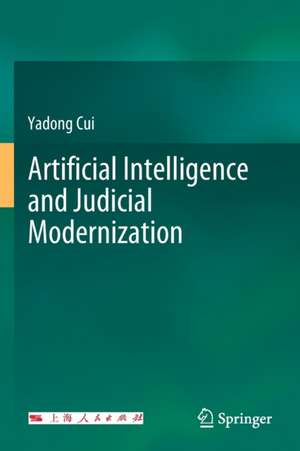Artificial Intelligence and Judicial Modernization
Autor Yadong Cuien Limba Engleză Paperback – 30 sep 2020
| Toate formatele și edițiile | Preț | Express |
|---|---|---|
| Paperback (1) | 766.26 lei 6-8 săpt. | |
| Springer Nature Singapore – 30 sep 2020 | 766.26 lei 6-8 săpt. | |
| Hardback (1) | 772.17 lei 6-8 săpt. | |
| Springer Nature Singapore – 30 sep 2019 | 772.17 lei 6-8 săpt. |
Preț: 766.26 lei
Preț vechi: 934.46 lei
-18% Nou
Puncte Express: 1149
Preț estimativ în valută:
146.69€ • 150.86$ • 121.70£
146.69€ • 150.86$ • 121.70£
Carte tipărită la comandă
Livrare economică 19 februarie-05 martie
Preluare comenzi: 021 569.72.76
Specificații
ISBN-13: 9789813298828
ISBN-10: 9813298820
Pagini: 224
Ilustrații: XXXIV, 224 p.
Dimensiuni: 155 x 235 mm
Greutate: 0.37 kg
Ediția:1st ed. 2020
Editura: Springer Nature Singapore
Colecția Springer
Locul publicării:Singapore, Singapore
ISBN-10: 9813298820
Pagini: 224
Ilustrații: XXXIV, 224 p.
Dimensiuni: 155 x 235 mm
Greutate: 0.37 kg
Ediția:1st ed. 2020
Editura: Springer Nature Singapore
Colecția Springer
Locul publicării:Singapore, Singapore
Cuprins
Preface: Leading edge of science and technology and be synchronized with The Times——artificial intelligence helps judicial reform and judicial modernization.- The Theory:Artificial intelligence and judicature ——the inevitable course to realize judicature modernization.- The Practice: Artificial intelligence helps judicial reform——reform of the litigation system centered on trial.- The Expectation: Opportunities and challenges of artificial intelligence ——constructing the future rule of law of artificial intelligence.
Recenzii
“This book has proven the successful and possible application of multimodal means to interpret the law. It makes great contribution to argue the possibility and feasibility of integrating high techs into the judicial field and offers an excellent example to follow for the future judicial reform. All in all, it can be foreseen that the “Shanghai Experience” has served successfully as an example to follow not only in the judicial field but also in other aspects of research and development.” (Le Cheng and Fei Xie, International Journal for the Semiotics of Law, Vol. 34, 2021)
“This is a well-written, interesting, and useful book for practicing engineers, researchers, and policymakers interested in China’s efforts at judicial modernization using AI.” (S. Ramakrishnan, Computing Reviews, February 19, 2021)
“This is a well-written, interesting, and useful book for practicing engineers, researchers, and policymakers interested in China’s efforts at judicial modernization using AI.” (S. Ramakrishnan, Computing Reviews, February 19, 2021)
Notă biografică
Yadong Cui, the former secretary and President of Party Committee of Shanghai Senior People's Court , and now the secretary and President of Party Committee of Shanghai Law Society. He delivered a keynote speech on "artificial intelligence and judicial modernization" at the World Artificial Intelligence Conference 2018 “AI and Law” Forum.
Textul de pe ultima copertă
This book comprehensively describes the status quo of artificial intelligence technology applications in the judicial field in China. Written by Cui Yadong, the former President of Shanghai Senior People's Court, it is divided into three parts: the first part focuses mainly on the theoretical issues related to artificial intelligence and judicial applications. The second part highlights practical aspects, discussing the research and development process, the implementation of the"206 system" and the major breakthroughs. The third part then addresses lessons learned and the thinking, particularly the thinking on "building the future rule of law of artificial intelligence", a new topic that responds to people's concerns about the risks and challenges of the development of artificial intelligence. In this context, the book argues that the judicial task is twofold: On the one hand, it should actively promote the integration and application of AI in the judiciary, judicial intelligence, and judicial modernization. On the other hand, it should encourage the construction of a future rule of law system of artificial intelligence, highlight the role of the judiciary in dealing with future risks and challenges, bring the development of artificial intelligence into line with the rule of law, and use the rule of law to promote, standardize and guarantee the safe, reliable and controllable development of artificial intelligence.
Caracteristici
Offers a Chinese perspective on the use of artificial intelligence in the judicial field
Introduces the research and development process and value of the Shanghai criminal case intelligent assistance system
Includes abundant practical data and analyses
Introduces the research and development process and value of the Shanghai criminal case intelligent assistance system
Includes abundant practical data and analyses
